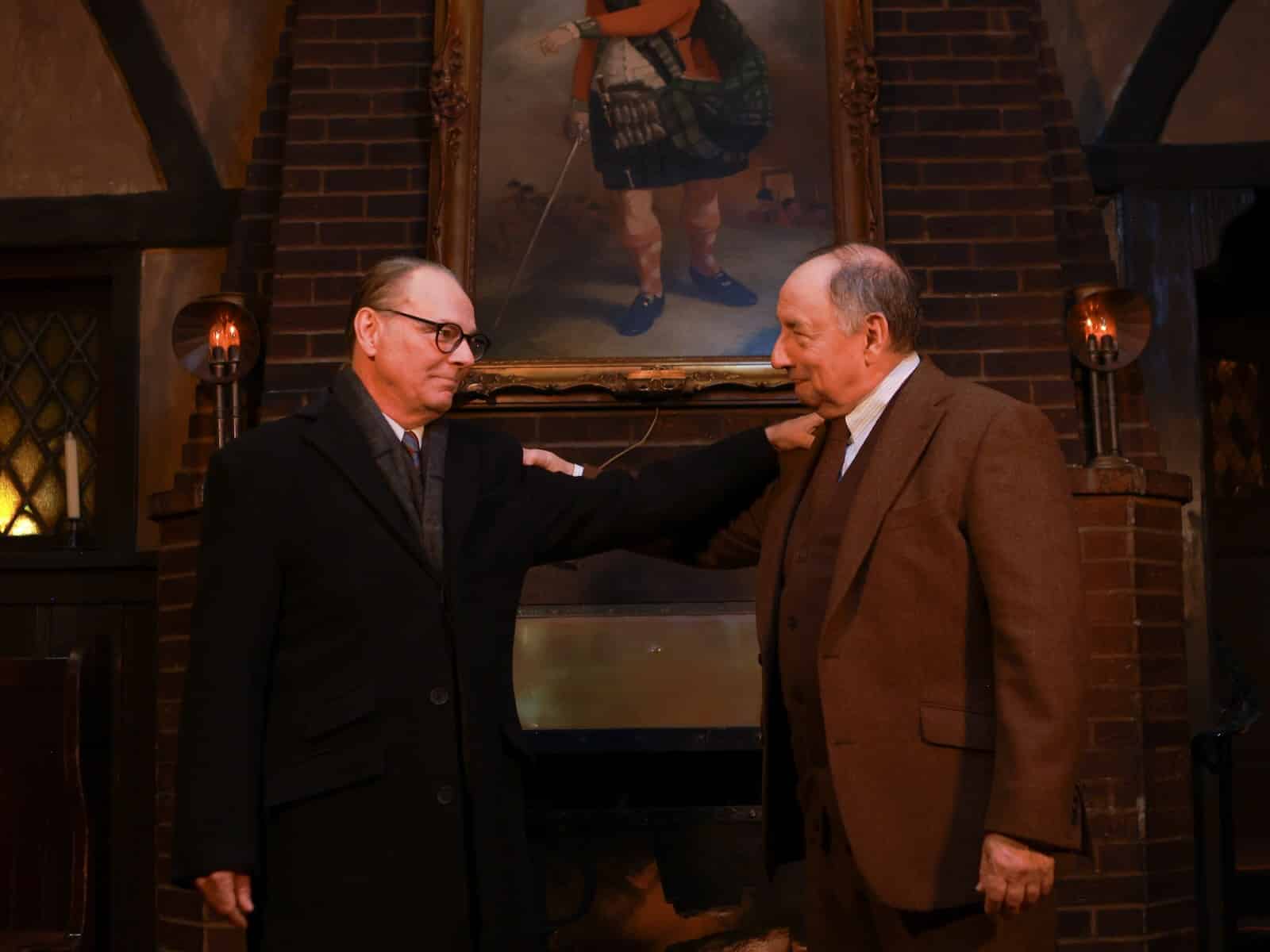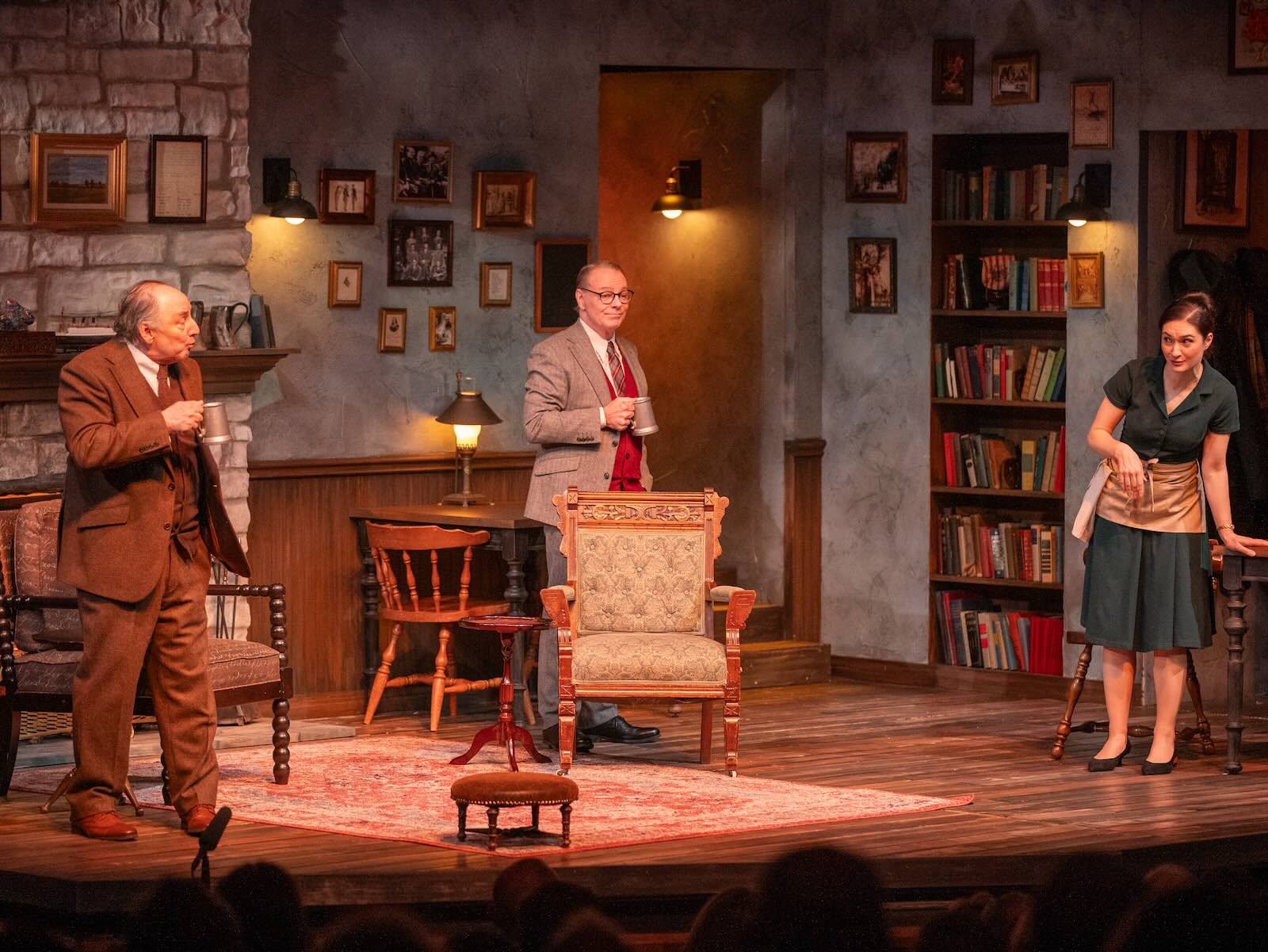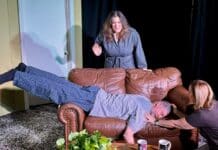Since 2023, the Museum of the Bible’s World Stage Theater has staged adaptations of three of C.S. Lewis’s seven Chronicles of Narnia novels. The theater’s latest play also draws inspiration from Lewis, this time from the writer’s own life and his real-life friendship with Lord of the Rings author J.R.R. Tolkien. Written by Dean Batali (best known for his work writing for television with That ’70s Show and Buffy the Vampire Slayer) and directed by Andrew Borba, Lewis & Tolkien imagines a late-in-life reunion between the two authors at the Eagle and Child Pub in Oxford, England.
Set designer Tom Buderwitz turns the stage into a cozy English pub with a fireplace, antique books and furniture, eclectic artwork and knickknacks, including a picture of Alice in Wonderland’s White Rabbit on the wall — a nod to the “Rabbit Room” in the real-life Eagle and Child, where Lewis, Tolkien, and their literary circle, the Inklings, gathered in the 1930s and ’40s. Warm lighting (lighting design by Max Doolittle) and soft piano music (sound design by Justin Schmitz) add to the ambiance.
Where the Museum’s Narnia plays have been staged elaborately with puppetry, costumes, lighting, sound, and complex set design, in Lewis & Tolkien, the design elements are much more understated, allowing the script and the acting to take center stage as the play explores the inner worlds and real-life relationship between the two authors.

When Arye Gross (Tolkien) and Bo Foxworth (Lewis) enter the pub, clad in the tweed jackets, waistcoats, and ties of retired Oxford scholars (costumes by Terri Middleton), they have not seen one another in ten years. Facing their own mortality in their later years, they return to a place where they share a deep history in an effort to move past the silence that has grown between them over the past decade. The depth of the two men’s friendship, their influence on each other, their creative, philosophical, and religious disagreements, and the reasons they drifted apart are gradually revealed and presented in a nonlinear fashion over the play’s 90 minutes.
From the beginning, Gross’s Tolkien and Foxworth’s Lewis delighted the Inklings fans in the audience with their witty and intellectual banter, pithy meditations on life, friendship, mortality, and creativity, and references to their beloved literary works. As beautiful as its language is, the deeply dialogue-driven script could have risked becoming bogged down in the recounting of shared history between Lewis and Tolkien, if not for barmaid Veronica, played by Anna Theoni DiGiovanni.
The only completely fictional character in the play, DiGiovanni’s Veronica keeps the pints coming and the conversation flowing, allowing Gross’s Tolkien and Foxworth’s Lewis to share their lives, their works, and their creative processes with fresh eyes. It is through Veronica’s eyes that audiences less familiar with Lewis and Tolkien come to understand their friendship and what she calls “the gifts it gave the world” in their written works — works that they deeply influenced one another in writing. While Veronica’s character largely functions as a plot device, Batali’s script affords her many of the funniest lines in the show, and DiGiovanni delivers them with impeccable comedic timing and presence.

Yet it is ultimately when the play is stripped back down to just the two friends in the room that it hits its most compelling notes. Foxworth particularly excels in his monologue as Lewis describing his grief over the death of his wife and the silence of friends like Tolkien “who could not come near … or didn’t know what to say.” When Gross, as Tolkien (who, as a devout Catholic, disapproved of Lewis’s marriage to a divorced woman, one of the causes of the distance between the two men), blinks back tears, stands up and sits down, rubs his hands together, and awkwardly struggles to communicate his regret, audience members were near tears right along with him.
In a venue that has hosted touring productions of The Chronicles of Narnia, and currently features an exhibit on C.S. Lewis’s life and work, undoubtedly many of those who come to see Lewis & Tolkien will be fans of the authors. Yet playwright Batali and director Borba — themselves friends since high school — have also created a moving exploration of the joys and sorrows of friendship, as well as the challenges of maintaining friendships over time, brought to life by a talented cast. In a time where friendship can be hard to find and even harder to keep, this play reminds us that it is worth fighting for.
Running Time: Approximately 90 minutes, without intermission.
Lewis & Tolkien plays through November 30, 2025, presented in association with MWO Productions, performing at the World Stage Theater on the fifth and sixth floors of the Museum of the Bible, 400 4th St SW, Washington, DC. Performances are on Thursdays, Fridays, and Saturdays at 7:00 pm, Saturdays at 2:00 pm, and Sundays at 3:00 pm. Tickets ($35-$59) are available for purchase online, at the Museum, or by calling (866) 430-MOTB.
The digital program for Lewis & Tolkien is available here.
Lewis & Tolkien
Presented in association with MWO Productions
By Dean Batali
Directed by Andrew Borba
Produced by Marc Whitmore and Lori Couto, with consulting producer Rob Loos
CAST
Anna Theoni DiGiovanni: Veronica
Arye Gross: J.R.R. Tolkien
Bo Foxworth: C.S. Lewis
CREATIVE TEAM
Set Designer: Tom Buderwitz
Costume Designer: Terri Middleton
Lighting Designer: Max Doolittle
Sound Designer: Justin Schmitz
Stage Manager: Sam Powers
SEE ALSO:
Up close with four folks who bring two famed authors to life in ‘Lewis & Tolkien’ (interviews by Hannah Estifanos, November 7, 2025)



